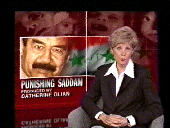|
On the unreported consequences of sanctions and war on the people of Iraq | |||
|
u n c o v e r I r a q . c o m |
|||
| a l b r i g h t: " w o r t h i t " | |||
| |||
|
CBS Reporter Lesley Stahl (speaking of post-war sanctions against Iraq): Madeleine Albright (at that time, US Ambassador to the UN): | |||
| |||
The "worth it" interview clipSeeing is believing. This video clip (choose format, below) may be downloaded to your computer under standard terms for Fair Use.
Historical contextIn these comments, Albright turns the central limitation of modern warfare -- the protection of non-combatants -- on its head. This tenet has been recognized for well over a millenium, since the Council of Le Puy in 975 and since Adomnan's Law of Innocents of 697. It is the core of all convention and law governing behavior during war. Many fear this constraint has been lost as warfare became mechanized and de-personalized during the last century. This may explain why Albright's comment provoked no outcry in the western media, no political controversy, and no immediate disavowals by governmental officials. The public stance was silence. Albright's apologyIn Albright's autobiography (Madame Secretary by Madeleine Albright with Bill Woodward, Miramax Books (Hyperior), New York, NY, 2003), she apologized for the remark (p. 174-175): I regret to say that I aggravated our public relations problems during a 1996 interview on the CBS program 60 Minutes. The segment included a visual tour of Iraqi health care facilities, with pictures of starving children and denunciations of UN policy by Iraqi officials. Little effort was made to explain Saddam's culpability, his misuse of Iraqi resources, or the fact that we were not embargoing food medicine or food. I was exasperated that our TV was showing what amounted to Iraqi propaganda. Near the program's end, Lesley Stahl asked me, "We have heard that half a million childrean have died [as a result of sanctions]. I mean, that is more children than died in Hiroshima. And, you know, is the price worth it?" Seven years passed between Albright's CBS interview (1996) and her autobiography (2003). During this time: None of these events figure in Albright's autobiography, and in fact her response contradicts itself. Albright's explanation ("Saddam Hussein could have prevented any child from suffering by simply meeting his obligations") is contradicted later on the same page when she notes: ... (My) speech ... reaffirmed (U.S. policy). The senior President Bush had vowed that sanctions would never be lifted as long as Saddam remained in power. In other words, the U.S. would not agree to ending sanctions should treaty obligations be met (verified disarmament). Rather, U.S. policy moved the goal posts, and tied the end of sanctions to a change of the Iraqi government. | |||
| Updated April 2007 | |||
| Photos and multimedia material on this page Copyright CBS News, 1996. | |||
|
FAIR USE NOTICE: This site contains copyrighted material the use of which has not always been specifically authorized by the copyright owner. We are making such material available in our efforts to advance understanding of moral, political, human rights, democratic, historical, and foreign policy issues, etc., especially as influenced and presented by mass media in the U.K. and U.S.. We believe this constitutes a 'fair use' of any such copyrighted material as provided for in section 107 of the US Copyright Law. In accordance with Title 17 U.S.C. Section 107, the material on this site is distributed without profit to those who have expressed a prior interest in receiving the included information for research and educational purposes. For more information go to: http://www.law.cornell.edu/uscode/17/107.shtml If you wish to use copyrighted material from this site for purposes of your own that go beyond 'fair use', you must obtain permission from the copyright owner. |

